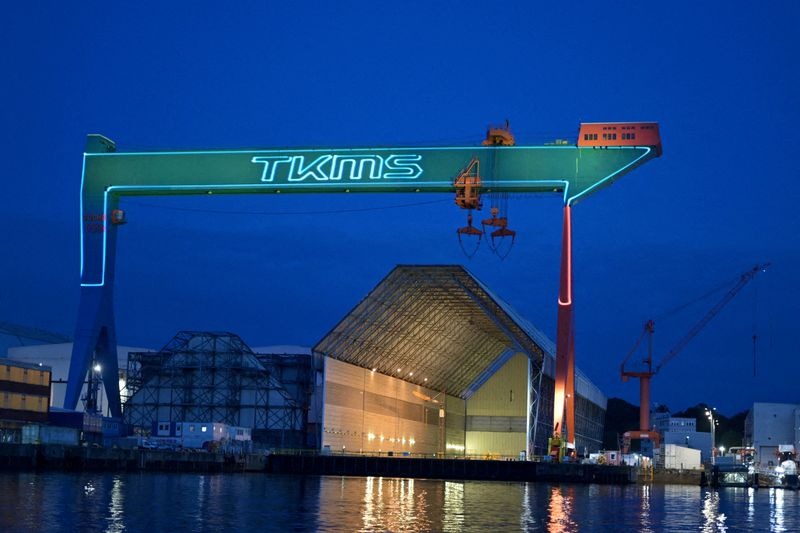
Follow WOWNEWS 24x7 on:

Germany-based ThyssenKrupp Marine Systems (TKMS), a global leader in naval shipbuilding and defense solutions, announced that its order backlog as of 2025 has expanded significantly to approximately 188 billion euros. In parallel, India’s Mazagon Dock Shipbuilders Ltd (MDL) has officially commenced contract negotiations for submarine procurement, marking a critical phase in strengthening naval capabilities through international collaboration.
Key Highlights of the Update
TKMS’s order backlog has climbed to a robust 188 billion euros, reflecting increased global demand for advanced naval vessels and defense technologies.
Mazagon Dock Shipbuilders Ltd has begun formal contract negotiations aimed at procuring submarines, underlining India’s strategic focus on expanding underwater defense assets.
These developments underscore growing defense procurement activities amid shifting geopolitical dynamics and modernization drives.
The collaboration hints at enhanced bilateral defense manufacturing and technology transfer prospects between Germany and India.
TKMS: Growing Order Backlog and Market Position
ThyssenKrupp Marine Systems stands as a major player in the global naval defense industry, known for designing and delivering submarines, surface ships, and integrated naval systems. The spike in TKMS’s order backlog to around 188 billion euros signals strong confidence from navies worldwide in its technological prowess and product range.
This substantial order book also points to rising investments by nations in naval fleet modernization, driven by increasing maritime security concerns and evolving warfare requirements. TKMS’s offerings span conventional and air-independent propulsion submarines, corvettes, frigates, and other customizable naval platforms.
Mazagon Dock Shipbuilders: Pivotal Submarine Procurement Talks
Mazagon Dock Shipbuilders Limited is among India’s premier shipyards engaged in constructing warships and submarines for the Indian Navy. The commencement of official contract negotiations related to submarine procurement represents a crucial marker in India’s defense modernization efforts.
These negotiations are expected to focus on acquiring cutting-edge submarine platforms, potentially involving technology transfer, local manufacturing, and framework agreements aligned with India’s strategic autonomy goals in defense production.
Strategic Importance of the Developments
Several factors make these updates significant on the defense and geopolitical front:
The expanded order backlog at TKMS reflects heightened procurement activity from navies globally amid rising maritime tensions in key regions like the Indo-Pacific, Europe, and the Middle East.
India’s active engagement through MDL signals its priority to enhance underwater warfare capabilities as a deterrent and strategic enabler.
Cooperation with TKMS and related entities could advance indigenous defense manufacturing under India’s Make in India initiative, fostering skills development and supply chain growth.
Broader Industry and Market Implications
The naval shipbuilding sector has gained immense importance as countries seek to secure maritime trade routes, protect sovereign waters, and maintain strategic deterrence. The increased orders for TKMS suggest intensified competition and demand for versatile, technologically advanced naval vessels.
India’s submarine acquisition negotiations indicate ongoing efforts to upgrade its naval fleet with modern and stealth-capable platforms, addressing regional security challenges and balancing power dynamics.
Challenges and Future Outlook
While promising, these developments come with challenges including complex contract negotiations, cost management, safeguarding technology interests, and ensuring timely project execution. Both TKMS and Mazagon Dock will need to navigate regulatory, operational, and geopolitical factors carefully.
Looking ahead, successful collaborations could lead to stronger defense ties, technology innovation, and enhanced maritime security frameworks for involved nations. The global naval shipbuilding landscape may see greater convergence driven by such partnerships and investment flows.
Conclusion
The surge in TKMS’s order backlog to 188 billion euros combined with Mazagon Dock Shipbuilders’ initiation of official submarine procurement talks represents a noteworthy phase in global and regional naval defense dynamics. These moves underscore not only escalating procurement momentum but also the growing importance of strategic partnerships in achieving defense modernization and maritime security objectives.
Source: Reuters




